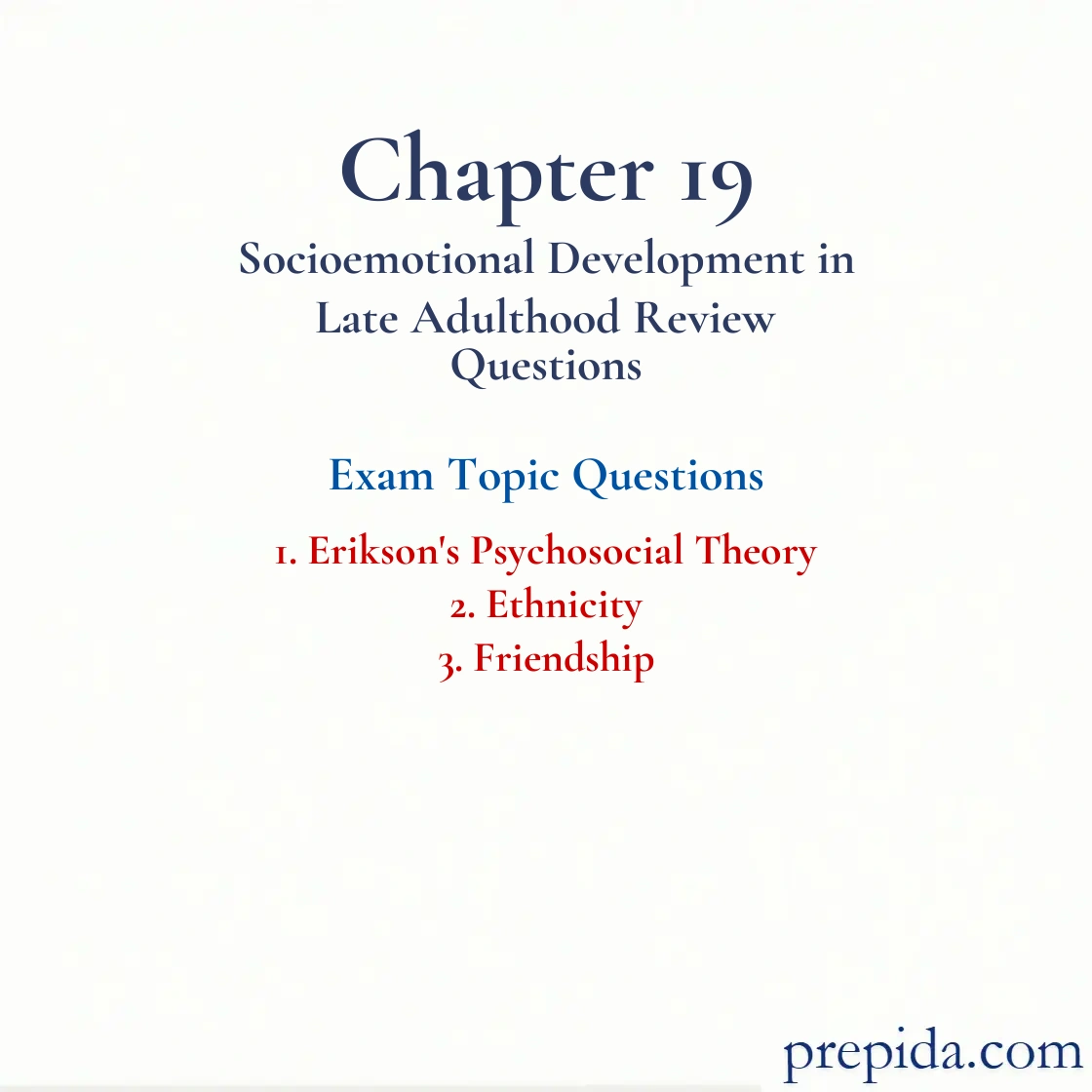
Which of the following is a positive resolution of the psychological conflict of intimacy vs. isolation?
- infidelity
- wisdom
- care
- love
Romantic Love: Also called passionate love or eros, romantic love has strong sexual and infatuation components and often predominates early in a love relationship.
According to Erikson, the positive resolution of which developmental stage culminates in appreciation of interdependence and relatedness in old age?
- generativity vs. stagnation
- basic trust vs. mistrust
- integrity vs. despair
- intimacy vs. isolation
According to Erikson, in old age, the positive resolution of the conflict of identity vs. confusion culminates in
- a sense of complexity of life.
- a merger of sensory, logical, and aesthetic perception.
- acceptance of the course of one's life and unfulfilled hopes.
- a sense of humor and resilience.
Sara is 17 years old. After being confused about her sexual orientation for a long time, Sara is finally able to identify herself as bisexual. According to Erikson's psychosocial theory, which of the following is most likely to be true of Sara when she reaches old age?
- She will have a strong sense of humor.
- She will believe that heterosexual relationships are immoral.
- She will appreciate the complexity of life.
- She will develop a sense of inferiority.
Theory: An interrelated, coherent set of ideas that helps to explain phenomena and facilitate predictions.
Which of the following is a positive resolution of the psychological conflict of autonomy vs. shame?
- fidelity
- purpose
- competence
- will
According to Erikson, in old age, the positive resolution of the conflict of intimacy vs. isolation culminates in
- acceptance of the cycle of life.
- a merger of sensory, logical, and aesthetic perception.
- acceptance of the course of one's life and unfulfilled hopes.
- a sense of complexity of relationships.
Which of the following is a positive resolution of the psychological conflict of basic trust vs. mistrust?
- hope
- purpose
- competence
- will
Hospice: A program committed to making the end of life as free from pain, anxiety, and depression as possible. The goals of hospice contrast with those of a hospital, which are to cure disease and prolong life.
Which of the following is a positive resolution of the psychological conflict of identity vs. confusion?
- fidelity
- wisdom
- care
- love
Affectionate Love: In this type of love, also called companionate love, an individual desires to have the other person near and has a deep, caring affection for the other person.
According to Erikson, which of the following stages of development does an individual experience in toddlerhood?
- autonomy vs. shame
- industry vs. inferiority
- basic trust vs. mistrust
- intimacy vs. isolation
According to Erikson, which of the following stages of development does an individual experience in infancy?
- autonomy vs. shame
- industry vs. inferiority
- basic trust vs. mistrust
- intimacy vs. isolation
Identify Erikson's developmental stage that individuals experience in school age.
- generativity vs. stagnation
- industry vs. inferiority
- identity vs. confusion
- intimacy vs. isolation
Identify Erikson's developmental stage that individuals experience in adolescence.
- generativity vs. stagnation
- autonomy vs. shame
- identity vs. confusion
- intimacy vs. isolation
Identity Diffusion: Marcia’s term for the status of individuals who have not yet experienced a crisis (explored meaningful alternatives) or made any commitments.
According to Erikson, who among the following is most likely to face a conflict between identity and confusion?
- Teena, a 14-year-old who joins a new school after her family's relocation from California to Texas
- Trevor, a 68-year-old retired military policeman who decides to spend the rest of his life as a pilgrim
- Anjali, a 25-year-old who receives admission into her desired college for a postgraduate program
- Lee, an 8-year-old who wins the spelling bee competition in his school
Adolescent Egocentrism: The heightened self-consciousness of adolescents.
Many ethnic minority workers never enjoy the Social Security and Medicare benefits to which their earnings contribute because
- most of them do not qualify for these benefits.
- they die before reaching the age of eligibility for benefits.
- their contributions to the benefits are negligible and thus might not get sufficient benefits.
- most of the ethnic minority workers are illegal immigrants.
Identify the possible double jeopardy for elderly ethnic minority individuals.
- sexism and chauvinism
- nepotism and egotism
- adultism and adultcentrism
- racism and ageism
Ageism: Prejudice against others because of their age, especially prejudice against older adults.
According to aging expert Laura Carstensen, who among the following tend to experience less intense positive emotions with new friends and equal levels of positive emotions with established friends?
- adolescents
- middle-aged adults
- younger adults
- older adults
Emotion: Feeling, or affect, that occurs when a person is in a state or interaction that is important to him or her. Emotion is characterized by behavior that reflects (expresses) the pleasantness or unpleasantness of the state a person is in or the transactions being experienced.